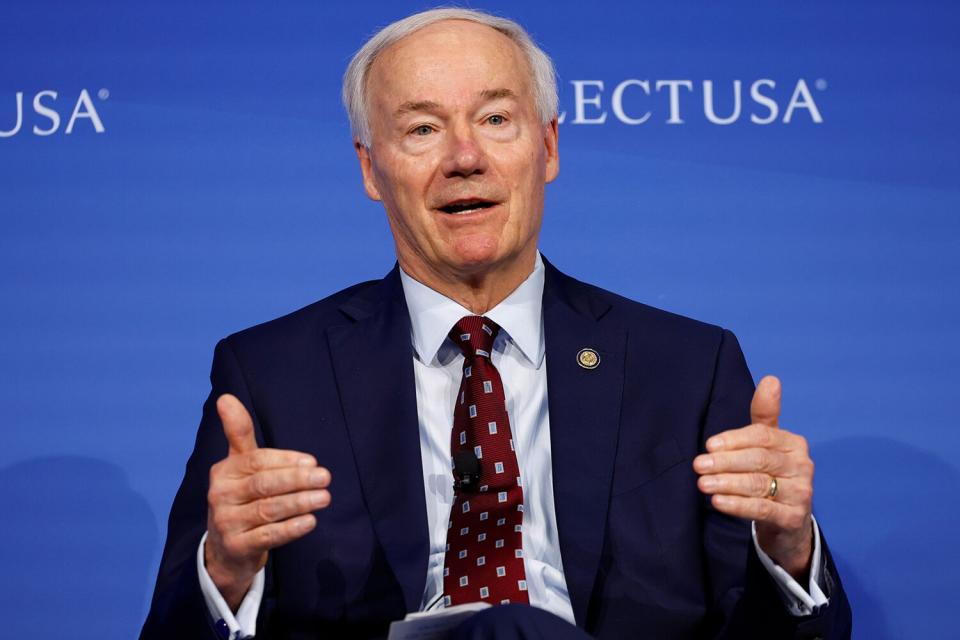Governor Who Signed Abortion Ban with No Exceptions for Rape or Incest Says 'It's Not the Debate Today'

The governor of Arkansas says he'd "prefer a different outcome" to a teen not being able to get an abortion in his state if impregnated by a family member as a result of rape.
During a conversation with Meet the Press' Chuck Todd that aired Sunday, Gov. Asa Hutchinson spoke on 2019's Act 180, which was triggered as a result of the U.S. Supreme Court's decision to overturn Roe v. Wade Friday.
As a result of the state law, which Hutchinson, 71, previously signed, abortion providers could now be fined up to $100,000 and/or face 10 years in prison. There are no exceptions for rape or incest, even in the case of a minor, with the only exception being if the life of the parent giving birth is in danger.
The governor was asked by Todd, 50, "If a 13-year-old in Arkansas is raped by a relative, that 13-year-old cannot get an abortion in Arkansas. Are you comfortable with that?"
"I would prefer a different outcome than that, but that's not the debate today in Arkansas," Hutchinson replied. "It might be in the future, but for now, the law triggered with only one exception ... as you [Todd] said, in the case of the life of the mother," he said.
Never miss a story — sign up for PEOPLE's free daily newsletter to stay up-to-date on the best of what PEOPLE has to offer, from juicy celebrity news to compelling human-interest stories.
EXCLUSIVE: Arkansas banned abortions except to save a mother’s life. @ChuckTodd: “If a 13yo in Arkansas is raped by a relative, that 13yo cannot get an abortion in Arkansas, are you comfortable with that?” @AsaHutchinson: “For now the law triggered with only one exception.” pic.twitter.com/mdDHiw0xlZ
— Meet the Press (@MeetThePress) June 26, 2022
Roe v. Wade, the landmark Supreme Court decision of 1973 that granted women the right to an abortion in every state, was overturned by the Supreme Court on Friday.
The 6-to-3 ruling reverses nearly 50 years of legal precedent and will completely change the landscape of women's reproductive rights by giving individual states the power to decide whether to allow the procedure. It is estimated that nearly half the country will enact near-total bans in the coming months.
Since the decision, states such as Arkansas, Kentucky, Louisiana, Missouri and South Dakota have already banned abortion after putting "trigger bans" in place that governors enacted after the Supreme Court ruling.

Ting Shen/Bloomberg via Getty Arkansas Gov. Asa Hutchinson
Protests have since erupted around the country and President Joe Biden has spoken out against the ruling, which he called the "realization of an extreme ideology and a tragic error by the Supreme Court."
Following the Supreme Court's decision, Hutchinson tweeted, "For decades I have said Roe v. Wade was wrongly decided. Today, the Supreme Court overturned the abortion ruling and returned the issue to the states. Arkansas is a pro-life state, and we are able now to protect life."
For decades I have said Roe v. Wade was wrongly decided. Today, the Supreme Court overturned the abortion ruling and returned the issue to the states. Arkansas is a pro-life state, and we are able now to protect life.
— Gov. Asa Hutchinson (@AsaHutchinson) June 24, 2022
RELATED: Most Americans Support a Woman's Right to Choose, Polls Show
Asked by Todd on Sunday whether the "morning-after pill qualif(ies) as contraception," Hutchinson said that the categorization belongs to the states but that it "should not be an issue" in Arkansas, and that IUDs will also "continue to be permitted" in the state.
"This is about abortion, and that's what has been triggered. It's not about contraception, that is clear. Women should be assured of that," he added.
Despite Hutchinson's comments about contraception, Justice Clarence Thomas' opinion in the overturning of Roe v. Wade suggested other landmark rulings — including those that protect contraception, same-sex relationships and same-sex marriage — could be in peril.
Thomas, 74, wrote in a concurring opinion excerpted on Twitter that the Supreme Court should reconsider Griswold v. Connecticut, Lawrence V. Texas and Obergefell v. Hodge — the rulings that currently protect the right to buy and use contraceptives without government restriction, the right to a same-sex relationship and the right to same-sex marriage.
From Thomas' concurring opinion: " ... in future cases, we should reconsider all of this Court's substantive due process precedents, including Griswold, Lawrence, and Obergefell. Because any substantive due process decision is 'demonstrably erroneous,' ... we have a duty to 'correct the error' established in those precedents ... "
If you or someone you know has been sexually assaulted, please contact the National Sexual Assault Hotline at 1-800-656-HOPE (4673) or go to rainn.org.


